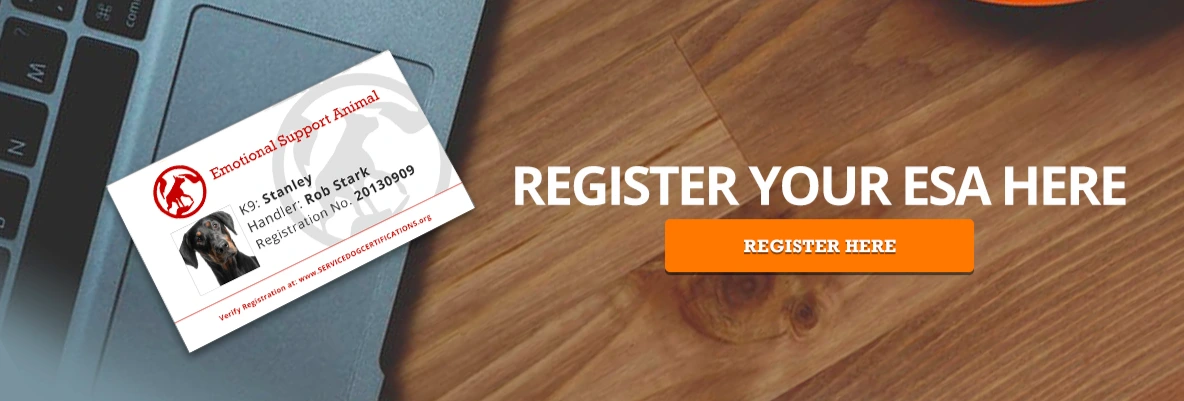Home Page › Blog › Emotional Support Dog Requirements
Emotional Support Dog Requirements

Are you confused when it comes to emotional support dog requirements? You’re not alone. There is a lot of information out there on this important subject, some of which is misleading or just plain false.
If you want to designate your dog as an emotional support dog (ESD), it’s important to understand all of the requirements, rules, and regulations.
In this post, we answer some of the most commonly asked questions about emotional support dogs/animals.
1. What is an emotional support dog?
An emotional support dog (ESD or emotional support animal, ESA) is a dog that is recommended by a licensed doctor, therapist, counselor, or social worker to help those that suffer from an emotional or mental health condition.
Emotional Support Dogs have rights that normal pets do not:
- An ESA has access to almost all types of housing regardless of no-pet policies. ESAs are protected under the Fair Housing Act so that they can live with their owners.
- Under this law, an ESA owner cannot be charged any fees for having an animal in their home.
2. Can I qualify for an emotional support dog?
You can qualify for an emotional support dog if you have an emotional or mental illness(es). If you suffer from one or more mental conditions listed below, you may qualify for an emotional support dog.
- Attention deficit disorder (ADD)
- Learning disorders
- Autism
- Generalized anxiety disorder (GAD)
- Gender dysphoria
- Bipolar disorder
- Cognitive disorders
- Depression
- Severe anxiety
- Post-traumatic stress disorder (PTSD)
It is up to a licensed healthcare professional to determine whether you have an eligible condition for owning an emotional support dog.
3. Emotional support dog training requirements
ESAs do not require specialized training, unlike service dogs, which require extensive training. Service dogs must perform specific tasks to aid in their handler’s disability.
While ESAs do not need any specialized training, they should still be well-behaved and under your control at all times. A landlord can kick out an emotional support dog if it is acting in an unsafe or destructive manner.
4. Emotional support dog registration requirements
Federal and state rules do not require you to register your emotional support dog. You also do not need a vest or ID card for your emotional support animal. Many ESA owners, however, choose to voluntarily register their animals and obtain ID cards and other accessories.
These items are helpful in buildings that normally don’t allow pets. They notified staff and other tenants that a legally protected assistance animal accompanies you. However, remember that your landlord can insist on seeing your ESA letter but not any other form of documentation.
5. Where to get an emotional support dog certificate
Many people think they need to obtain an ESA “certificate” to qualify their dog as an emotional support animal. They are often confusing a certificate with an ESA letter. You can obtain a certificate for your emotional support dog after getting an ESA letter, but a certificate alone will not qualify your dog as an ESA.
You must have an ESA letter from a licensed mental health professional confirming your need for an emotional support animal. An ESA letter should have the following:
- The ESA letter should be dated within one year of submission
- The ESA letter should be on your provider’s official letterhead
- The ESA letter should include the provider’s license number, date, and direct contact information
6. Emotional support dog vest options

Emotional support animals can live in “no-pets” apartments and condos without being charged rent or fees. An emotional support dog does not need to wear a special vest when on the premises.
However, some owners prefer to have one. The ESD vest is a great way to identify your canine as a legal assistance animal and will help prevent any confusion and questions you encounter from building staff and neighbors.
7. Can my ESD go into restaurants or markets with me?
No, emotional support dogs are not allowed in public places that prohibit pets. ESAs have rights under federal and state housing laws but not under the Americans with Disabilities Act. The only type of mental health assistance animal that has public access rights are psychiatric service dogs.
8. Are there breed or weight restrictions for emotional support dogs?
No, your emotional support dog can be of any size and breed. This rule even protects breeds that are commonly discriminated against, such as Pit Bulls or Dobermans. You can even have more than one emotional support animal if your therapist recommends it.
Emotional support dogs work
If you believe you or a loved one may benefit from an ESD, don’t hesitate to make an appointment with your mental health professional to start the process.
If you do not have access to a healthcare professional or are intimidated by the idea of reaching out for help, consider using an online service to get your ESA letter. ESA rules specifically allow for remote online providers to write ESA letters, so your letter will be just as valid as one obtained in person.
About the Author: The writing team at Service Dog Certifications is made up of folks who really know their stuff when it comes to disability laws and assistance animals. Many of our writers and editors have service dogs themselves and share insights from their own experiences. All of us have a passion for disability rights and animals.
212 comments
Leave a Reply Cancel reply
Latest Posts

How to Bring a Service Dog to Disneyland
Trained service dogs are more than welcome to join their handlers at Disneyland. In this guide, we’ll explain Disneyland’s policies and give practical advice for bringing a service dog to Disneyland for the first time. Disneyland’s Service Dog Policies The Magic Kingdom is happy to welcome trained service dogs across most park locations! They kindly […]

Read More

Can Dogs Eat Tomatoes?
Yes! Dogs can safely enjoy tomatoes, but there are a few risks to be aware of so you can feed your dog responsibly. Fully ripe tomatoes (without the stems and leaves) can actually have nutrients that are good for your pup. Tomatoes have chlorogenic acid, an antioxidant that can have anti-inflammatory effects in cells. They’re […]

Read More

Can a Primary Care Doctor Write an ESA Letter?
Your family doctor, also called a primary care physician (PCP), can write a letter recommending an emotional support animal. We’ll explain what legally gives them that ability and explore what better options might be available for you. Why are Physicians Able to Write an ESA Letter? To turn your pet into an emotional support animal, […]

Read More







Can an apartment building have breed restrictions? And will I be responsible for damages or if the dog attacks someone?
Yes, if your dog attacks another person or another animal, you will be potentially liable. If the dog causes damages outside of normal wear and tear it will be deducted from your deposit or you will be responsible for the costs. As far as breed restrictions, that is dependent on the state or even locality. Sometimes the restricted breeds are protected, sometimes they aren’t.
My recommendation with ESAs is always look for a calm or highly motivated dog that you will be able to train, as an ESA should be under the handlers control at all time. If getting a puppy, start basic obedience training and socialization early on. If adopting, again start with basic obedience early, if you notice aggressive or destructive behaviors work to redirect that, even if it means getting a behaviorist or trainer involved.
I suffer from PTSD evaluated by the VA and suffer from severe outrage because my whole house was robbed of everything. I have nothing, only my dog who keeps tab on me whenever I’m about to go bonkers. He has saved me from getting stung from over 300 scorpions and other dangerous insects. I can’t live without him. Is the VA doctor report valid enough to receive a ESD certificate?
Can you legally wear a vest/harness on your emotional support dog if you/they do not have a liscence? If so what color and can they have an emotional support badge on thier vest or no? Thanks
No, that would be frowned upon in many states! Falsely claiming a dog to be an ESA or Service Dog is also unfair to others who depend on their assistance animals. So please refrain from doing so.
However, if you feel you may qualify for an emotional support animal, speak to your therapist or find a legitimate online service with doctors who can assess your disability and issue an ESA letter. You’ll then be legally allowed to identify your dog as an emotional support dog. You may find this article on how to qualify for an ESA interesting https://www.servicedogcertifications.org/how-to-qualify-for-an-emotional-support-animal/
What about someone with Borderline Personality Disorder? Would we qualify?
Mental illness is a disability that qualifies you for an Emotional Support Animal. You will need to work with a licensed mental health professional directly to know for sure. For more information, you may find this article helpful – https://www.servicedogcertifications.org/emotional-support-dog-certification-registration/
I am 13 and I have ADD I was wondering if I am allowed to make my German Shepherd a ESD ? Is there an age requirement?
Yes you can there are no age requirements you just have to be prescribed it
What I’m curious about is when your dog does damage ruining the carpet who pays for that? I have been A landlord for 25 years and there is cost involved no matter what you think. I guess a guy probably just has to raise his rent to cover animals in case somebody wants to bring them into your apartment without paying the fees.
It just doesn’t seem right that you would require another person to pay for your expense. I don’t mind Helping people that need it I do mind helping the scammers and this whole thing is filled with scammers.
My understanding is that while no additional costs (pet rent/deposit) can be charged at move in, if damage beyond normal wear and tear occurs, the tenant is responsible for the costs just as they would be without a pet. This may differ state to state, so check your local laws.
Is the ESA letter only valid for 1 year?
Correct, the ESA letter for travel is valid for one year from the date of issue. You can renew the letter every year. You may find this article on ESA Letters interesting – https://www.servicedogcertifications.org/how-to-get-an-emotional-support-dog-letter/